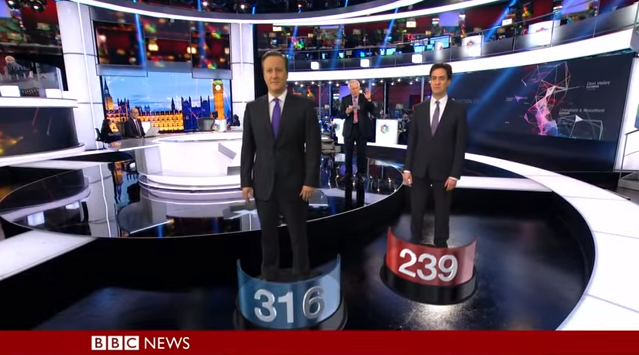Be careful with your election predictions, the opinion polls could be very wrong. Again

Just after 10pm on 8 June, the nation is going to look at the exit poll numbers on the screen and, if they are roughly what the final opinion polls said, will mutter to itself, “Thought so.” If they are very different, however, many people will still say, “Thought so” – either because the numbers are favourable to their party, or because they have instantly rationalised the result as inevitable, a result that we should have seen coming. Once again, they’ll say, the pollsters missed something critical.
All the pollsters have adjusted their methods since the last election, to try to correct for getting it wrong then (Anthony Wells posted a good summary here), but suppose something else has changed: what might that something be?
The Leadership Factor
One such issue was identified by ComRes in its poll for The Independent this weekend. The company noted that Theresa May has a big lead in the “better prime minister” question, 51 per cent saying she would be better, against 30 per cent saying Jeremy Corbyn would be better. That 21-point lead is bigger than the 12-point lead the Conservatives have in share of the vote.
At the last election, David Cameron had an advantage over Ed Miliband of 14 points on a differently worded “best prime minister” question. On that question, May had a 28-point lead over Corbyn at the start of this month. If the party leaders have an effect on voting over and above what people tell pollsters about their voting intention, it may be that the current opinion polls are underestimating the Conservatives and overestimating Labour.
ComRes produced alternative voting intention figures by reallocating “undecideds”, who say they will nevertheless vote, according to who they say would make the better prime minister. With this adjustment, the Conservative vote share rose to 48 per cent and Labour fell to 33 per cent, increasing the Conservative lead from 12 to 15 points.
The Youth Vote
Another thing that might be different at this election is the effect of Corbyn – and specifically of his promise to abolish tuition fees – in motivating young people to vote. Turnout among 18 to 24-year-olds was slightly higher in 2010, when the Liberal Democrats promised to abolish tuition fees, than it was in 2015, when none of the main parties made such a commitment, even though overall turnout was lower. (Ipsos MORI: turnout among 18 to 24s 44 per cent against 43 per cent; overall turnout 65.1 per cent and 66.4 respectively).
Even so, the Lib Dems failed to outperform the opinion polls as a result, falling four points short, although that may have had more to do with the general unwinding of “Cleggmania”.
However, Corbyn’s different approach to politics could encourage more young and disengaged people to vote than the pollsters’ turnout models expect, in the way that 6 per cent of the electorate who do not usually vote turned out in the EU referendum. Matt Singh, who wrote a celebrated blogpost on the eve of the 2015 election, saying he didn’t think the polls were right, claims that much of the difference between pollsters now is because some (such as YouGov) believe young people when they say they are more likely to vote this time, while others (including ComRes and ICM) expect them to turn out as they have done in the past.
Added to that, there is the question of what effect the social care fiasco might have on turnout rates among older people, usually high.
The Fundamentals
Finally, there is politics. My view is that the polls last time failed to pick up the uncertainty of some of the Labour vote. People were worried about a hung parliament with Ed Miliband trying to do deals with the Scottish National Party. I imagined a voter hesitating over their choice and thought I could guess which way they would tend to go.
The trouble is that my view of what the fundamentals are can be wrong. In the EU referendum I thought the hesitating voter would come down on the side of staying in, but it may have been that going out was the default vote: what was the worst that could happen? We had been outside the European project before, after all.
So... I don’t know
I previously thought the youth turnout could be a significant factor in this year’s general election, but now that I have looked at the Lib Dem experience in 2010 I doubt it somewhat. I also don’t think Theresa May’s leadership is perceived as being as strong as the numbers suggest – but Corbyn’s leadership is weak, and his failure to command the support of his MPs is pretty fundamental.
The pollsters have adjusted for their miss last time, but if they miss again it is still more likely to be by overestimating Labour and underestimating the Conservatives.

 Yahoo News
Yahoo News 